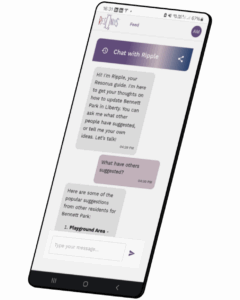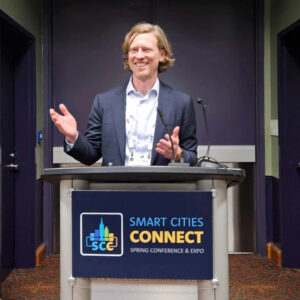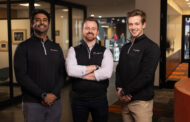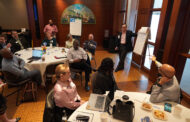Even a ripple can make waves, said Mitch Mabrey, an exited cleantech founder whose new cause finds him on a mission to ensure that the voices of residents from all walks of life are more broadly heard — and answered — by their government officials.
Resonus, his Kansas City-based political information platform is designed to effortlessly connect users to local government by curating targeted conversations with officials and neighbors about the topics they care about most.
“The name comes from the Latin word for ‘resonate,’ so multiple people saying something amplifies it or makes it louder,” explained Mabrey, founder of Resonus. “We’re trying to really break down barriers of knowledge, so that people across the socio-economic spectrum can engage with the government when they’re interested in it.”
While doing market research around Kansas City, Mabrey — an innovator who previously co-founded the now-exited Spear Power Systems in Grandview — found that people consistently had an interest in being able to directly message leaders, he said.
“So I took that and did some customer discovery interviews with cities and counties and talked to them about their pain points around communicating with people,” Mabrey explained, noting those talks resulted in a product dubbed Resonus Conversations.
The Conversations platform will allow users within partner cities to chat with a bot named Ripple, Mabrey said, another naming nod to waves that resonate. He picked text messaging as the communication vehicle since it’s popular with both older and younger people.
“The long-term goal is that you could ask Ripple anything about local government and they would answer it for you,” he explained. “So you could ask a question like, ‘What day are the fireworks?’ ‘What day does my trash get picked up?’ ‘When do I pay my property tax?’ You could do a service request where you would say, ‘Someone hit the stop sign. Could someone repair it?’ ‘Or there’s a pothole here.’”
ICYMI: Meet 5 new startups bolstering KC innovation (now with a funding boost from Digital Sandbox)
What makes the platform unique, he said, is that users can make suggestions to local government and then engage in a dynamic conversation with officials and neighbors. No other tool he’s seen allows users to do that.
For example, Mabry explained, a user can suggest adding a bike lane to a certain street and give the reasons why they think it’s a good idea. Then other users who have opted into notifications for a certain area can weigh in on the idea of the bike lane. The platform then aggregates that information and sends it to the proper city officials. The open issue will stay on the city’s dashboard until the users that weighed in on the issue are informed of what the city decided.
“The idea is this super easy point of entry that all they have to do is know this number they text or they have this app on the phone that they just open up and start writing,” he explained. “They don’t have to do any research or know anything about how government works.”
“With our system we’re really trying to just supplement traditional ways of the city communicating with residents,” he added.
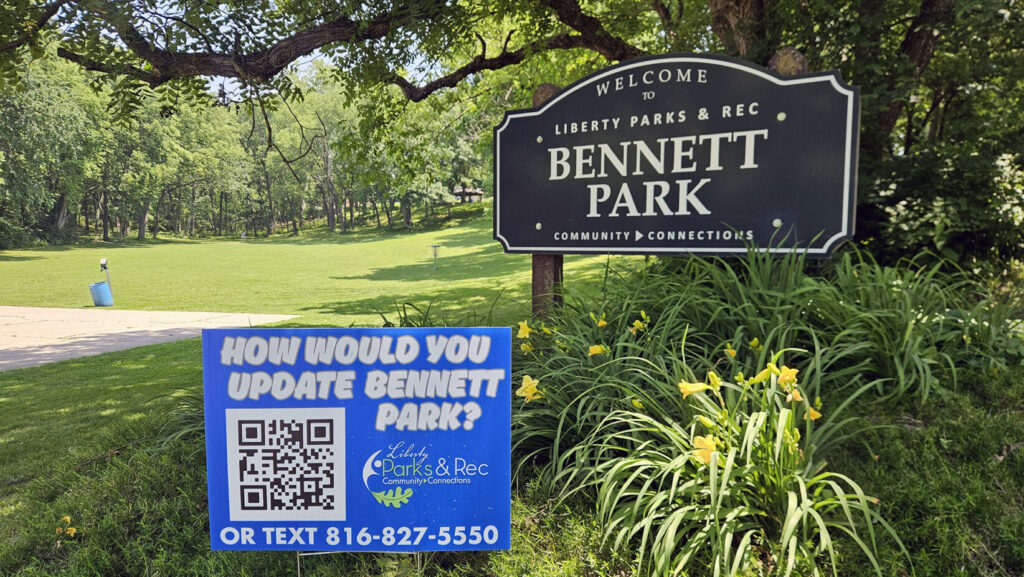
A Resonus at Bennett Park in Liberty, Missouri, helps residents better connect with local officials; courtesy photo
Testing the tech
Resonus is currently in the midst of a three-month partnership with the City of Liberty, Missouri, to test out the Conversations prototype, Mabrey shared, gathering input around parks improvements.
“We’ve already had 10 times the number of people use it than those that normally show up to their public meetings,” he said. “We’ve done a great job of validating anecdotal things that the parks (and recreation) director has heard. We have real data now showing that hundreds of people think that these top four to six ideas are their priorities for what to do with the parks improvements.”
“So far, I’m super excited,” he added. “It’s been working great. The parks director is really happy.”
One highlight from the pilot is that they have been overperforming with people in their 30s and 40s, he noted.
“If we look at the distribution of other folks who are participating versus the population curve for Liberty and Clay County, we’re outperforming in that working age — which is unusual for traditional public engagement around projects — because it tends to be retirees as they have time.”
The govtech startup also has an upcoming pilot project with the planning and zoning department for a coastal city in the Southeast, Mabrey said. He connected with the city after KC Digital Drive recommended he pitch Resonus at the Smart Cities conference.
“They have a really innovative chief innovation officer,” he continued. “And they have this great program they call the Living Lab, a combination of economic development and allowing the city to try out new things. So essentially, they screen technologies like this, and then they find a sponsor within the city’s different departments — in my case the planning and zoning group — and everybody gets a fixed grant for the demonstration period.”
“Then, if it works, they can choose to re-up and to continue using an ongoing basis,” he added.
The city will be using the Conversations platform to help communicate with citizens as the city works on its land use comprehensive plan, he noted.
“It’s a city that has changed a lot,” he said. “It’s actually become quite a bit older and has a lot of Baby Boomers who are retiring there. So a big topic there is rentals versus people who own versus vacation rentals. I’m sure that will be something we’ll see a lot of comments on.”
Mabrey also attended the Civ Start State of Gov Tech for the second year in June and has ongoing conversations with cities from across the country, he noted. He’s targeting cities with populations of 5,000 to 50,000 and is always looking for cities who are interested in partnering.
“The idea is to try to get a foothold in a regional market with one city, get them set up in a pilot, convert them to a recurring subscription, and then add cities around them,” he explained. “For Ripple to offer a seamless user experience we need adjacent cities as customers.”
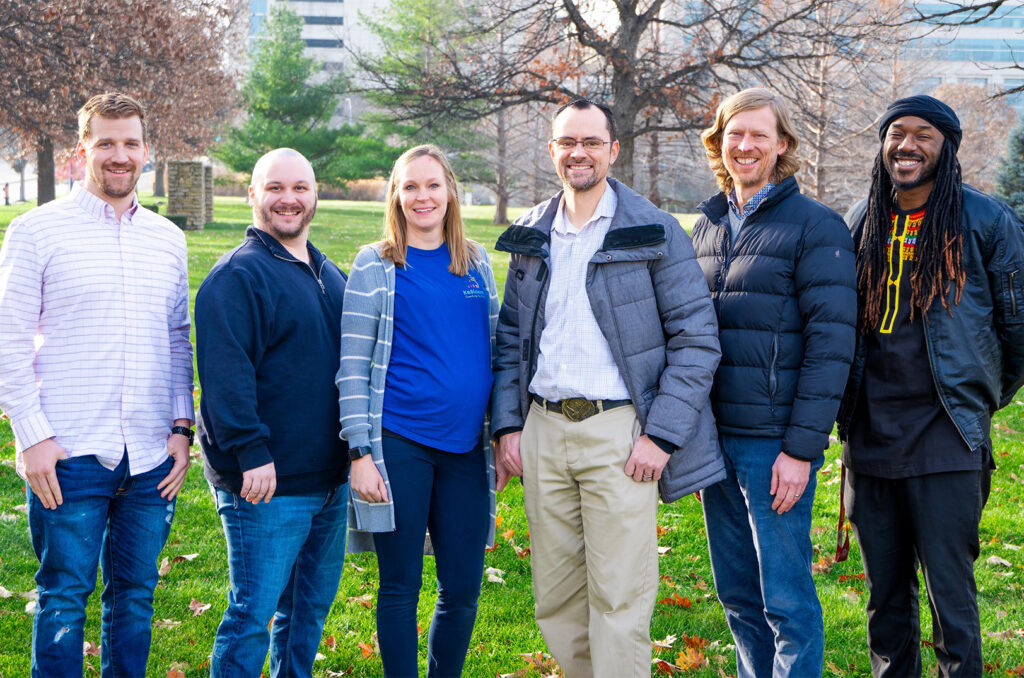
Digital Sandbox KC Q4 2024 winners: Alex Snook, CEO, and Errick Quartucci, COO, On | Sight; Erin Minoski, founder and owner, KaBloom; Zack Edwards, president, Xogos Gaming; Mitch Mabrey, founder and CEO, Resonus; and Rich Chungong, founder and CEO, Produce Matrix
Fertile ground for innovation
While Mabrey spent more than a decade working in the electric battery industry, he also has a little bit of experience in government, he shared; Mabrey was in the U.S. Foreign Service from 2003 to 2007, living in places like Guyana and Paris. He then spent time in South Africa in 2023 — where he researched a lot about the political and economic situation — before returning to Kansas City.
“As we were headed back to the States I realized the antagonistic view of Americans toward government at many levels was not so different from what we had seen abroad,” he said.

Mitch Mabrey, Resonus, shares about an early version of his startup during the June 2024 Startup Crawl in the Power & Light District in downtown Kansas City; photo by Tommy Felts, Startland News
So for the August 2024 primaries, he began working on a tool to help people know more about down-ballot candidates — crafting the early stages of Resonus’ story.
“We built an AI tool that created profiles for all candidates and then showed you which candidates had the strongest correlation to your personal interests,” he explained. “Unfortunately, that type of service is challenging to monetize. We’d still like to offer it in the future as a complement to what we’re working on now..”
Shortly after the primary, Mabrey pivoted to doing his research that led to Conversations. He said that if the platform is going strong by March and can subsidize the voter info tool, then he would consider having it ready for the August 2026 mid-term primaries.
“But if it’s not then, then we won’t,” he added.
With other govtech businesses like PayIt, mySidewalk, and Daupler in the Kansas City area and CivicPlus in Manhattan, plus the Federal Reserve, IRS, and GSA in Kansas City, the region is an interesting test bed for startups like his, he noted.
“We actually have a decent little cluster of govtech businesses,” he explained. “It’s a place where the Kansas City startup ecosystem could develop more businesses in this area.”







